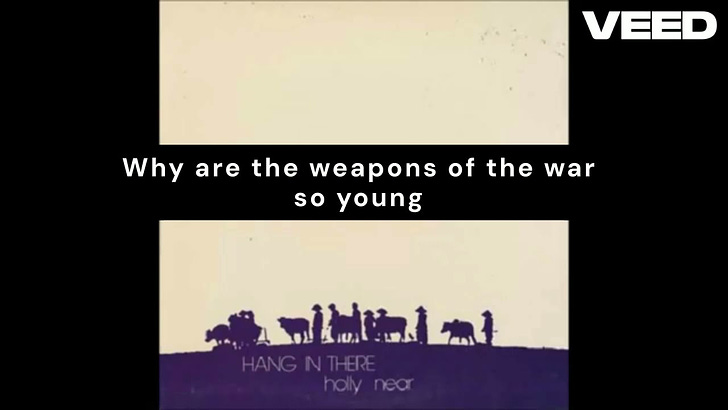Hi all,
Thank you for joining me for today’s song, “No More Genocide”, by Holly Near. If you’d like to hear the song before you read the background, I’ve included a YouTube video below each article.
Below, you’ll find my interpretation of the lyrics (written in italics). Comments and questions are welcome. For Japanese students, vocabulary words in bold are provided in Japanese below.
✳️ Note: The level of this article is for students with a TOEIC of 550+, Eiken Pre-1, CEFR B2.
Today’s song asks some simple questions. Why are we lied to? Who benefits and who loses? Today’s article discusses the lyrics of two versions of the song.
Version 1
(466 words)
The first, from Holly Near’s 1973 album, Hang In There, discusses U.S. involvement in Vietnam. Over 1 million people died as a result of the war.
Why do we call them the enemy, this struggling nation / We've been bombing across the sea? / Why do we want these people to die? / Why do we say North and South? / Oh, why, oh why, oh why? / That's just a lie / One of the many and we've had plenty / I don't want more of the same / No more genocide in my name!
The song continues by pointing out that the beginning of U.S. history usually begins with Columbus “discovering” new land. Schoolbooks rarely discuss the millions of people who already lived in North and South America, how they suffered from diseases brought by Europeans and were conquered, slaughtered.
Oh, why are our history books so full of lies / When no word is spoken of why the Indian dies / Or why the Chicanos love the California land? / Do all books say it was discovered by the white men? / That's just a lie …
The song questions why is it only young men who were sent to die in the Vietnam war and why so many of them were black Americans or people of Latin American ancestry. In 1965, many African Americans fought in Vietnam. They made up 31% of soldiers, even though they were only 12% of the population. They also suffered 24% of U.S. Army deaths. Hispanic Americans, who were 4.5% of the population, faced 5.5% of Vietnam War deaths.
Oh, why are the weapons of the war so young / And why are there only older men around when it's done? / Why are so many of our soldiers black or brown? / Do we say it's because they're good at cutting yellow people down? / That's just a lie …
In the following verse, Near mentions “two men”. Here, she’s referring to Daniel Ellsberg and Anthony Russo. In 1969, the two made photocopies of 7,000 pages of classified documents that showed that the government had lied to Congress and the American people throughout the war in Vietnam. The documents were called The Pentagon Papers. They gave the copies to the New York Times and the Washington Post who published the material. It was shown that the U.S. was not “preserving democracy” but was trying to prevent Vietnam from choosing a communist form of government. The papers exposed the government's manipulation of public opinion and Congress, shaking public trust in the authorities and made opposition to the war stronger.
Then came two men from the world of secrecy / And they carried some secrets off / To shares them with you and me / I read the Pentagon Papers seeking truth in their history / But who says that we have been preserving a democracy / That's just a lie…
Vocabulary
genocide 大量虐殺
conquer 征服する
slaughter 虐殺
photocopies プリント
classified 機密扱い
preserve 守る
manipulation 誤魔化し
secrecy 秘密
For further details about this song and about Holly joining the FTA antiVietnam War road show, see the notes under the video of this song posted by Vietnam War Songs here.

Version 2
(595 words)
Another version of the song was released in 2002 on Holly’s album, And Still We Sing: The Outspoken Collection. The lyrics give further examples of the lies we are often told.
For example, schoolbooks also don’t discuss how California became part of the U.S., by the slow invasion of settlers from the east, ending in a war with Mexico in which the U.S. took control of 55% of Mexico (see map above). A chicano (m.) or a chicana (f.) is an American of Mexican origin or descent.
Why are our history books so full of lies / When no word is spoken of why the Indians died / Or that the Chicanos loved the California land / Do our books all say it was discovered by one white man
Most people have studied about Nazi horrors during World War II and know about the Ku Klux Klan that was responsible for the murders of thousands of black Americans in the 1800s and 1900s. How many people are aware that such groups still exist?
Nazi forces grow again, ignorance gives them a place / The Klan is teaching children to hate the human race
In the 1960s, the U.S. further developed its nuclear weapons program. “MX” stood for “Missile Experimental”. The missile could carry up to 12 warheads, each one with the power of 10 Hiroshima bombs. The main problem was where to keep the missiles. Some plans called for building more silos, others for burying them in the desert, or putting them on railroad cars so they could easily be transported around the railway system.
Where once there was a playground, now an MX missile plan / Do they think it's fun to see just how much we can stand
There are people who say we must defend ourselves with such weapons, that there’s nothing we can do about starvation, poverty, etc. They might say, “As long as I’m safe, it’s okay. I will carry a gun to defend myself and my family.”
People die all around the world from starvation and grief all the time / Some folks try to avoid the truth by saying God and gun will provide
The Saint James Church massacre occurred in Cape Town, South Africa, on July 25, 1993. A group of men with guns entered the church during a service, killing 11 people and injuring dozens more. The attack was motivated by political and racial tensions during apartheid-era South Africa.
In the last verse, Holly lists many examples of the killing of large numbers of people.
In Auschwitz, Capetown and Beirut (Lebanon, civil war, 1975-1990), San Salvador (El Salvador, civil war, 1979-1992) , Greensboro (The Greensboro Massacre, 1979 when members of the Communist Workers Party held an anti-Ku Klux Klan demonstration in Greensboro, NC. Klansmen and Nazis opened fire, killing five protesters. It raised questions about white supremacist violence and the response of the police), Belfast (a city in Northern Ireland where there was conflict between two groups of people from the late 1960s to the late 1990s. One group, mostly Catholic, wanted Northern Ireland to be part of Ireland. The other group, mostly Protestant, wanted Northern Ireland to stay part of the United Kingdom.) Manila (long-standing conflict between the government and various Muslim rebel groups) and many more / It's a crime / Do we think the fascist right will save the world in time / They try to tell us so, but we’ve got to tell them, “No!”
Tell them that it’s a lie / One of the many and we've had plenty / I don't want more of the same / No more genocide in our name!
Question:
Do you think history books tell the whole truth? Why or why not?
Vocabulary
invasion 侵入
settlers 入植者
descent (メキシコ)系である
ignorance 無知
warheads 弾頭
bury 埋める
defend 守る
(political and racial) tensions (政治的および人種的)緊張
apartheid-era アパルトヘイト時代
white supremacist 白人至上主義者
rebel(s) 反逆者
Sources
Ellsberg, D. (2002). Secrets: Revealing The pentagon papers: A memoir. Viking.
Maxwell, B. L. (2023, December 18). Remembering the Chicano Vets of Vietnam. The Daily Chela. https://www.dailychela.com/chicanos-of-vietnam-war/ . Accessed 16 March 2024.
National Archives and Records Administration. (no date). Treaty of guadalupe hidalgo (1848). National Archives and Records Administration. https://www.archives.gov/milestone-documents/treaty-of-guadalupe-hidalgo#:~:text=With%20the%20annexation%20of%20more,the%20present%2Dday%20United%20States . Accessed 16 March 2024.
Pincus, W. The many ways MX is hysterical. The Washington Post. (Nov 21, 1982). https://www.washingtonpost.com/archive/opinions/1982/11/21/the-many-ways-mx-is-hysterical/29ee2b81-02cf-4451-ad69-0cf2bc6eab4f/ Accessed 16 March 2024.
Research guides: Racial, ethnic, and religious minorities in the Vietnam War: A resource guide: Introduction. Introduction - Racial, Ethnic, and Religious Minorities in the Vietnam War: A Resource Guide - Research Guides at Library of Congress. (n.d.). https://guides.loc.gov/racial-ethnic-and-religious-minorities-in-the-vietnam-war. Accessed 16 March 2024.






The sad truth behind every war ever fought has rarely been written in a truthful and factual way… the words are always swayed one way or another, usually depending on the author… and invariably it is the natives of the land who speak the highest truth… which is always always one of utter horror…
I had not idea of the statistics you state, so sad and shocking - almost like an ethnic cleansing…😔
Dear Louise,
Another straightforward example of Social Issues in Song! You have no shortage of great songs like this for your newsletter, don't you?
Thank you for your background explanation. I listened to the two versions of the song before reading your explanation. As you guessed it right, I had no idea about the "two men." Now I know. Thank you.
Mitsuru Hiki